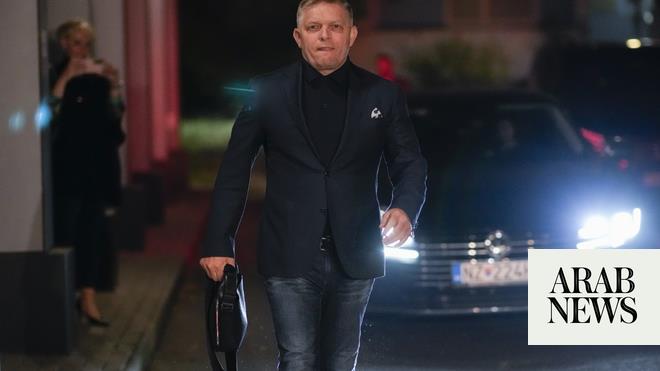
BRATISLAVA, Slovakia: A populist former prime minister who campaigned on a pro-Russian and anti-American message looked to be heading for victory in early parliamentary elections in Slovakia, according to preliminary results early Sunday.
With results from almost 88 percent of about 6,000 polling stations counted by the Slovak Statistics Office, former Prime Minister Robert Fico and his leftist Smer, or Direction, party led with 23.7 percent of the vote.
A liberal, pro-West newcomer, the Progressive Slovakia party, was a distant second with 15.6 percent of the votes cast Saturday.
With no party likely to win a majority of seats, a coalition government would need to be formed.
The left-wing Hlas (Voice) party, led by Fico’s former deputy in Smer, Peter Pellegrini, was in third with 15.4 percent. Pellegrini parted ways with Fico after Smer lost the previous election in 2020, but their possible reunion would boost Fico’s chances to form a government.
“It’s important for me that the new coalition would be formed by such parties that can agree on the priorities for Slovakia and ensure stability and calm,” Pellegrini said after voting in Bratislava.
The populist Ordinary People group was in fourth and the conservative Christian Democrats in fifth.
Two parties close to the 5 percent threshold needed for representation in the 150-seat National Council could be potential coalition partners for Fico — the ultranationalist Slovak National Party, an openly pro-Russian group, and the Republic movement, a far-right group led by former members of the openly neo-Nazi People’s Party Our Slovakia.
The pro-business Freedom and Solidarity party also could get seats.
Final results were expected to be announced later Sunday.
The election was a test for the small eastern European country’s support for neighboring Ukraine in its war with Russia, and a win by Fico could strain a fragile unity in the European Union and NATO.
Fico, 59, vowed to withdraw Slovakia’s military support for Ukraine in Russia’s war if his attempt to return to power succeeded.
Michal Simecka, a 39-year-old member of the European Parliament who leads the liberal Progressive Slovakia, campaigned promising to continue Slovakia’s support for Ukraine.
Fico, who served as prime minister from 2006 to 2010 and again from 2012 to 2018, opposes EU sanctions on Russia, questions whether Ukraine can force out the invading Russian troops and wants to block Ukraine from joining NATO.
He proposes that instead of sending arms to Kyiv, the EU and the US should use their influence to force Russia and Ukraine to strike a compromise peace deal. He has repeated Russian President Vladimir Putin’s unsupported claim that the Ukrainian government runs a Nazi state.
Fico also campaigned against immigration and LGBTQ+ rights and threatened to dismiss investigators from the National Criminal Agency and the special prosecutor who deal with corruption and other serious crimes.
Progressive Slovakia, which was formed in 2017, sees the country’s future as firmly tied to its existing membership in the EU and NATO.
The party also favors LGBTQ+ rights, a rarity among the major parties in a country that is a stronghold of conservative Roman Catholicism.
“Every single vote matters,” Simecka had said Saturday.
Popular among young people, the party won the 2019 European Parliament election in Slovakia in coalition with the Together party, gaining more than 20 percent of the vote. But it narrowly failed to win seats in the national parliament in 2020.










